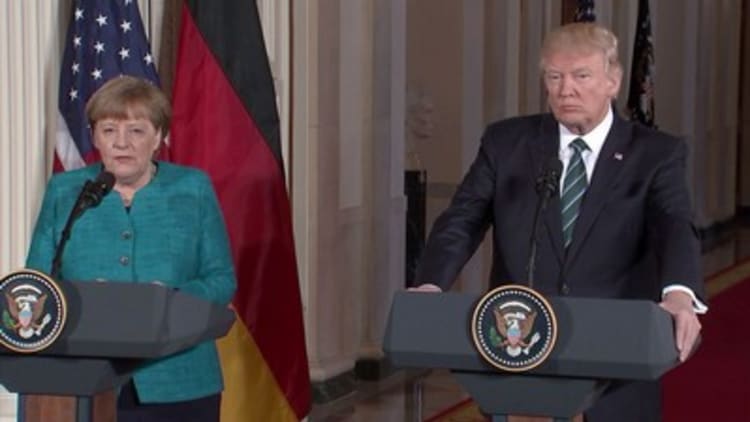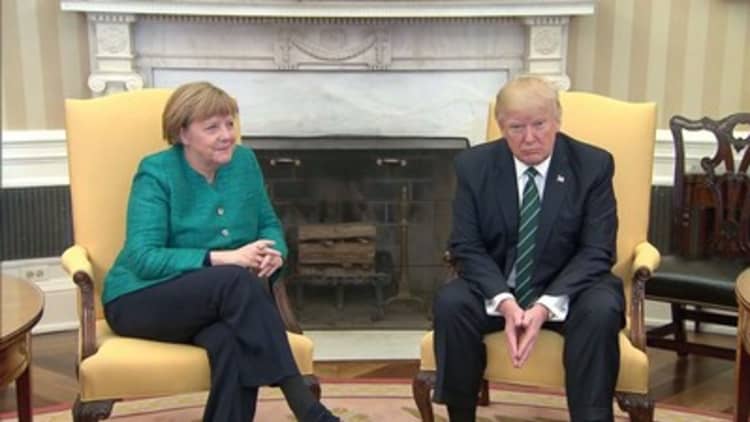
Germany's Angela Merkel has directly and publicly questioned the United States' commitment to Europe — and in all likelihood that very much pleases Russia's Vladimir Putin.
At a series of diplomatic meetings last week, President Donald Trump disappointed European allies on issues related to defense, Russia and climate change. Merkel, typically a careful speaker seen as a key defender of a united Europe, then said at a campaign event Sunday that the "times in which we could rely fully on others" are "somewhat over."
Trump has repeatedly expressed apparent animosity toward the European Union and the North Atlantic Treaty Organization, institutions that have checked Russian influence in the region for decades. His decision not to explicitly endorse the NATO commitment to defend allies if they're attacked raised particular alarm among former diplomats, especially since his failure to do so comes just as Russia has become more militarily assertive.
'Probably very pleased'
Putin, Russia's president, sees opportunity in a weakened trans-Atlantic alliance. Russia — including the Soviet Union before it — has found itself set against a united West since at least 1949. The Americans, Western Europeans and Canadians militarily blocked the Soviet Union up to 1991, and have economically dwarfed it ever since. Moscow also has long resented European and American criticism of its human rights record.
A divided West is easier to confront than a united one, and the United States and Germany are the two biggest economies in the Western alliance.
Speaking to MSNBC on Tuesday, former U.S. Ambassador to Russia Michael McFaul said, "I think the Russians are laughing" in the wake of Trump's meetings last week with European leaders from NATO and the Group of Seven major industrial nations.

"They're laughing at how easy it is and how our president, unfortunately, is helping with their agenda," McFaul said. "Let's just be clear that NATO and G-7, those are our clubs ... that we set up to advance our national security interests, to advance our prosperity, and the result of this trip has been discord in both of those groups."
On Sunday, Trump tweeted that the trip to Europe was "a great success for America." Press secretary Sean Spicer added Tuesday that Trump and Merkel "get along very well" and said her call for Europe to take care of itself is what Trump wanted.
"More countries are stepping up their burden sharing. That's a good thing for them, that's a good thing for NATO, that's a good thing for America," Spicer said.
But leaders like Merkel and newly elected French President Emmanuel Macron have shown that fracturing Europe could prove tough regardless of whether Trump is involved, according to Frances Burwell, a fellow at the Atlantic Council who focuses on EU-U.S. relations.
"I do think that President Putin was probably very pleased to see the way the meetings went this past weekend. But it's far more important to note that his [anti-EU] candidate" — Marine LePen, who is believed to have received assistance from the Kremlin — "lost the French election," she said.
"For the moment," Burwell said, "I think what's going to matter is that Europeans stay together."
The Russian embassy press office in Washington directed CNBC to a tweeted statement from press secretary Dmitry Peskov, who said the U.S. and the EU should "tackle their relations by themselves" and that those ties are "not our concern." He said that Russia has "always relied only on itself throughout centuries."
Trump, who won the White House with an anti-global message, has repeatedly bashed NATO and the European Union, which have formed the basis of U.S.-Europe cooperation for decades. While the White House says that the president is committed to alliances, he appeared to irk NATO members by publicly reprimanding them for not meeting their defense spending targets.
Merkel has shifted recently by pushing for Continental self-reliance in the face of anti-EU movements within Europe, including the United Kingdom's vote to leave the union, Burwell said. Still, it is important to note that Merkel expressed her doubts about U.S. support at a campaign event in Germany, where anti-Trump rhetoric plays very well generally.
Trump on Tuesday again attacked Germany for not meeting defense spending targets mandated by NATO and for its trade relationship with the U.S., contending — without any explanation — that "this will change."
Putin is likely hoping that, if U.S. support wanes, "Europe will begin to falter," Burwell said. But she added that "Europe is becoming more united than we expected it to be," especially after Macron's win over far-right candidate Le Pen.
Macron aimed to show that when he met Putin in France on Monday. The French president pressed his Russian counterpart on LGBT rights, Moscow's support for the Assad regime in Syria and alleged misinformation spread by Russia-funded media outlets in the French presidential campaign, according to The Associated Press.


